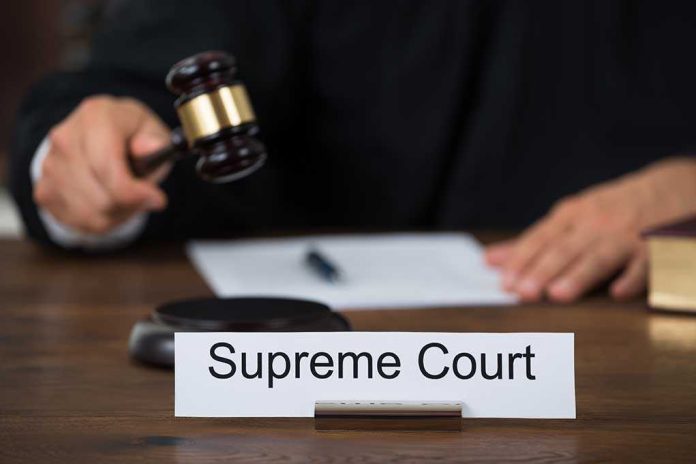
The Supreme Court dealt a crushing blow to free speech rights by declining to hear the case of a Massachusetts teacher fired over social media posts made before she was even hired.
Key Takeaways
- The Supreme Court refused to hear Kari MacRae’s appeal, effectively ruling that schools can fire teachers for social media posts made before employment.
- MacRae was terminated in 2021 for posts deemed offensive to LGBTQ+ individuals and racially insensitive, despite making them before being hired.
- A Boston federal judge granted qualified immunity to school officials and ruled the potential for “disruption” justified her firing.
- This decision creates a dangerous precedent allowing employers to punish public employees for past speech that doesn’t align with current institutional politics.
- The case highlights growing concerns about the erosion of First Amendment protections in the digital age.
Court Refuses to Protect Teacher’s First Amendment Rights
In a troubling development for free speech advocates, the U.S. Supreme Court has declined to hear the appeal of Massachusetts teacher Kari MacRae, who was fired from Hanover Public Schools in 2021 over social media posts she made before being hired. This decision effectively upholds lower court rulings and sends a chilling message to public employees nationwide: your past expressions, even those made as a private citizen before employment, can be grounds for termination if they don’t align with your employer’s political views. The rejection leaves standing a dangerous precedent that threatens to further erode First Amendment protections in the digital age.
The Troubling Case of Kari MacRae
MacRae’s ordeal began shortly after she was hired when school administrators discovered social media posts she had made prior to her employment. These posts reportedly contained comments regarding LGBTQ+ issues and race that the school deemed offensive and potentially disruptive to the educational environment. Rather than evaluating MacRae’s actual classroom performance or giving her an opportunity to address concerns, school officials swiftly terminated her employment. This reactionary approach demonstrates how quickly public institutions are willing to sacrifice individual rights to avoid potential controversy, particularly when it involves conservative viewpoints that challenge progressive orthodoxy.
Following her termination, MacRae filed a lawsuit against Hanover Public Schools, arguing that her firing constituted a clear violation of her First Amendment rights. The case centered on the application of a 1968 legal precedent concerning free speech and public employment. However, a Boston-based federal judge ruled in 2023 that the school had shown sufficient “risk of disruption” to justify MacRae’s firing, despite the fact that no actual disruption had occurred. The judge also granted qualified immunity to school officials involved in the firing decision, shielding them from personal liability for potential constitutional violations.
Dangerous Precedent for Public Employees
The Supreme Court’s refusal to hear MacRae’s appeal effectively endorses the troubling principle that public employers can discipline or terminate employees based on speech made before their employment. This decision creates a scenario where Americans must now consider how every social media post, comment, or expression might be weaponized against them by future employers, regardless of when those statements were made. The ruling is particularly concerning for conservatives who already face significant discrimination in educational institutions dominated by leftist ideology.
What makes this case especially alarming is the vague standard of “potential disruption” used to justify the firing. This nebulous criterion can be applied subjectively to silence virtually any viewpoint that challenges institutional orthodoxy. Public schools, which should be bastions of free thought and diverse perspectives, are instead becoming enforcers of ideological conformity. The message sent to teachers and other public employees is clear: conform to progressive talking points or risk your career, even for statements made years before your employment.
Broader Implications for Free Speech
This case represents yet another example of how constitutional protections are being eroded in service to woke ideology. Conservative Americans are increasingly finding themselves in positions where they must self-censor to protect their livelihoods, while progressive views are celebrated and promoted within public institutions. The standard applied in MacRae’s case creates an environment where employers can conduct political background checks by scouring social media for any content that might conflict with current institutional politics, effectively imposing retroactive speech codes on citizens.
As President Trump continues to fight for the restoration of American freedoms, cases like MacRae’s highlight just how far the country has strayed from its founding principles. The Court’s refusal to hear this important case represents a missed opportunity to reaffirm the primacy of First Amendment protections in the digital age. For conservative Americans, the message is unmistakable: the battle to preserve fundamental constitutional rights must be fought not just in the courts, but in every institution where woke ideology threatens to undermine individual liberty and freedom of expression.



